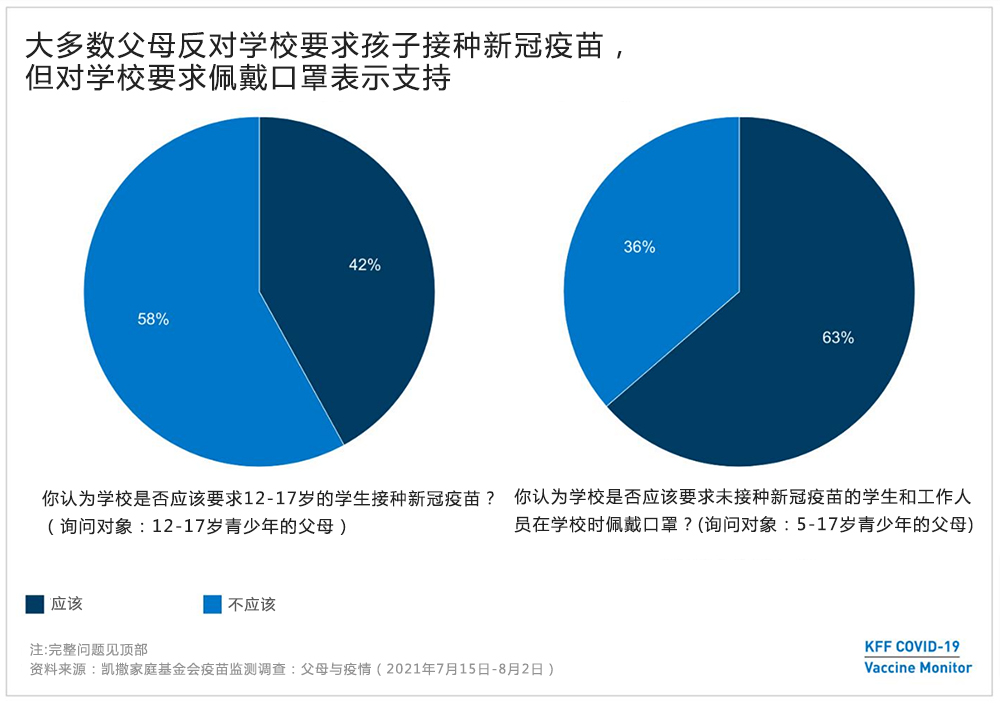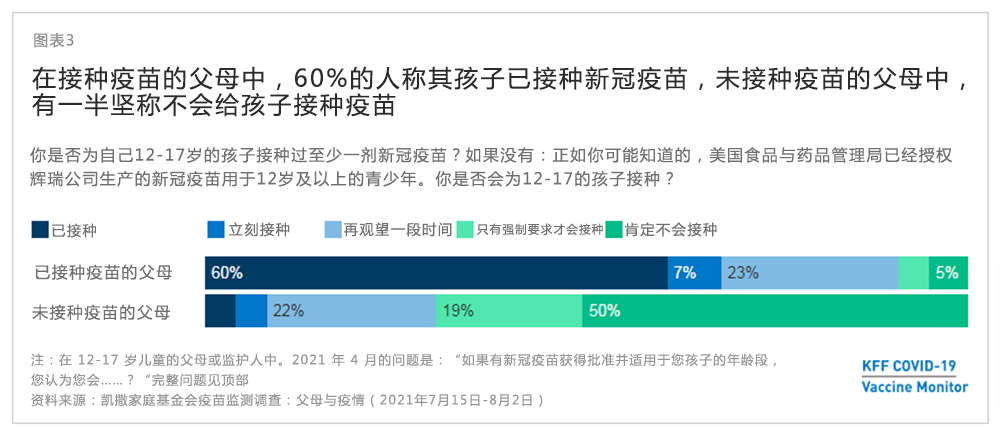8月11日公布的一项新调查显示,对学校要求佩戴口罩佩以预防新冠病毒的传播的要求,绝大多数美国父母表示支持。然而,父母们对于新冠疫苗强制注射令的支持率却普遍较低。随着人们在新一轮新冠疫情和德尔塔变种病毒病例激增的阴影笼罩下回归新学年,不要指望自身都未接种的这类成年人群会让其孩子接种新冠疫苗。

值得注意的是,7月底,美国疾病控制和预防中心(Centers for Disease Control)不仅建议那些未接种人群要佩戴口罩,同时还呼吁所有美国学校都要佩戴口罩,包括那些位于没有新增病例地区的学校。该机构称,校内任何人员,包括老师、学生、员工和访问者,都应该佩戴口罩,即便是已经完全完成新冠疫苗接种的人也不例外。
辉瑞(Pfizer)/BioNTech基于mRNA的新冠疫苗并不是当前唯一获美国食品与药品管理局(Food and Drug Administration)批准、可用于12-17岁青少年的疫苗。Moderna也已经申请将疫苗拓展至这一年龄段,而且预计在数月甚至数周内就能够得到批准。美国第三种获批疫苗的生产商强生(Johnson & Johnson)还未提出类似申请,但计划在今年秋季之前招募岁数低至12岁的儿童参加其单针剂新冠疫苗实验。
然而,对注射疫苗的犹豫不决以及加剧新冠疫苗分歧的奇怪社会政治因素,继续影响着父母对于上学子女接种疫苗的看法。如果一位父母接种了,那么其子女至少接种一针疫苗或即将尽快接种的概率就会大幅提升。另一方面,高达50%的未接种父母对凯撒家庭基金会(KFF)说,他们“肯定不会”让其12-17岁的孩子接种辉瑞的获批疫苗,而另有19%表示只会在政府或学校系统下达强制令后才会接种。

凯撒家庭基金会还深入挖掘了让父母对孩子接种疫苗感到害怕的原因。毕竟,有5%的已接种疫苗父母称他们“肯定”不会在开学之前给孩子接种,而且还有23%的人希望在做出决定之前“再观望一段时间”。
看来,有关各类疫苗(尤其是新冠疫苗)的长期传闻以及被揭穿的谣言是父母犹豫不决的根本原因。特别是那些对于遭到广泛反驳的谣言深信不疑的父母,因为在这些谣言中,有的称新冠疫苗的有效性被媒体过于夸大,还有的称接种后的副作用可能比患感染新冠病毒更严重。第二种观点在那些还没有接种的成年人中广为流传。
然而,父母(其中也包括一些已经接种的父母)对新冠疫苗不利于其子女的看法所造成的涓滴效应,凸显了一些非主流顾虑。凯撒家庭基金会研究报告的几位成年人作者写道,这些顾虑包括担心新冠疫苗可能“会对其孩子未来的生育能力带来负面影响”。这些作者都有未接种的12-17岁孩子。
该研究称,“据报道,在未接种青少年的父母中,有四分之三(73%)担心疫苗可能会对孩子未来的生育能力带来负面影响,尽管美国疾病控制中心称‘没有证据显示任何疫苗,包括新冠疫苗,会导致女性或男性不孕不育问题。’”在这些父母中,有88%依然不清楚新冠疫苗是否对儿童有影响而感到“非常”或“有些”担忧。接近80%的父母担心其孩子可能不得不面对新冠疫苗的严重副作用。
那些已经接种的父母不大可能会说自己存在同样的健康焦虑问题。然而,70%的已接种父母依然对新冠疫苗给其孩子带来的严重副作用感到担忧,其中有58%的父母质疑疫苗可能会对孩子未来的生育能力带来影响。那些孩子在学校的父母普遍认为,学校会在没有父母的许可下强制为孩子接种疫苗。
因此,尽管7%的已接种父母可能计划让其年幼的孩子或青少年在疫苗可用之后“马上”接种疫苗,但23%的“观望型”父母可能会要求获得更多令人信服的证据,同时,占有压倒性比例的未接种成年人似乎已经决定,绝不会让其孩子注射疫苗。(财富中文网)
译者:冯丰
审校:夏林
8月11日公布的一项新调查显示,对学校要求佩戴口罩佩以预防新冠病毒的传播的要求,绝大多数美国父母表示支持。然而,父母们对于新冠疫苗强制注射令的支持率却普遍较低。随着人们在新一轮新冠疫情和德尔塔变种病毒病例激增的阴影笼罩下回归新学年,不要指望自身都未接种的这类成年人群会让其孩子接种新冠疫苗。
值得注意的是,7月底,美国疾病控制和预防中心(Centers for Disease Control)不仅建议那些未接种人群要佩戴口罩,同时还呼吁所有美国学校都要佩戴口罩,包括那些位于没有新增病例地区的学校。该机构称,校内任何人员,包括老师、学生、员工和访问者,都应该佩戴口罩,即便是已经完全完成新冠疫苗接种的人也不例外。
辉瑞(Pfizer)/BioNTech基于mRNA的新冠疫苗并不是当前唯一获美国食品与药品管理局(Food and Drug Administration)批准、可用于12-17岁青少年的疫苗。Moderna也已经申请将疫苗拓展至这一年龄段,而且预计在数月甚至数周内就能够得到批准。美国第三种获批疫苗的生产商强生(Johnson & Johnson)还未提出类似申请,但计划在今年秋季之前招募岁数低至12岁的儿童参加其单针剂新冠疫苗实验。
然而,对注射疫苗的犹豫不决以及加剧新冠疫苗分歧的奇怪社会政治因素,继续影响着父母对于上学子女接种疫苗的看法。如果一位父母接种了,那么其子女至少接种一针疫苗或即将尽快接种的概率就会大幅提升。另一方面,高达50%的未接种父母对凯撒家庭基金会(KFF)说,他们“肯定不会”让其12-17岁的孩子接种辉瑞的获批疫苗,而另有19%表示只会在政府或学校系统下达强制令后才会接种。
凯撒家庭基金会还深入挖掘了让父母对孩子接种疫苗感到害怕的原因。毕竟,有5%的已接种疫苗父母称他们“肯定”不会在开学之前给孩子接种,而且还有23%的人希望在做出决定之前“再观望一段时间”。
看来,有关各类疫苗(尤其是新冠疫苗)的长期传闻以及被揭穿的谣言是父母犹豫不决的根本原因。特别是那些对于遭到广泛反驳的谣言深信不疑的父母,因为在这些谣言中,有的称新冠疫苗的有效性被媒体过于夸大,还有的称接种后的副作用可能比患感染新冠病毒更严重。第二种观点在那些还没有接种的成年人中广为流传。
然而,父母(其中也包括一些已经接种的父母)对新冠疫苗不利于其子女的看法所造成的涓滴效应,凸显了一些非主流顾虑。凯撒家庭基金会研究报告的几位成年人作者写道,这些顾虑包括担心新冠疫苗可能“会对其孩子未来的生育能力带来负面影响”。这些作者都有未接种的12-17岁孩子。
该研究称,“据报道,在未接种青少年的父母中,有四分之三(73%)担心疫苗可能会对孩子未来的生育能力带来负面影响,尽管美国疾病控制中心称‘没有证据显示任何疫苗,包括新冠疫苗,会导致女性或男性不孕不育问题。’”在这些父母中,有88%依然不清楚新冠疫苗是否对儿童有影响而感到“非常”或“有些”担忧。接近80%的父母担心其孩子可能不得不面对新冠疫苗的严重副作用。
那些已经接种的父母不大可能会说自己存在同样的健康焦虑问题。然而,70%的已接种父母依然对新冠疫苗给其孩子带来的严重副作用感到担忧,其中有58%的父母质疑疫苗可能会对孩子未来的生育能力带来影响。那些孩子在学校的父母普遍认为,学校会在没有父母的许可下强制为孩子接种疫苗。
因此,尽管7%的已接种父母可能计划让其年幼的孩子或青少年在疫苗可用之后“马上”接种疫苗,但23%的“观望型”父母可能会要求获得更多令人信服的证据,同时,占有压倒性比例的未接种成年人似乎已经决定,绝不会让其孩子注射疫苗。(财富中文网)
译者:冯丰
审校:夏林
A strong majority of American parents support masking requirements in schools to protect against COVID, according to a new survey released on August 11. But support for COVID vaccine mandates is much lower among parents generally. And don't count on groups such as unvaccinated adults to get their children a coronavirus shot as we head back into the school year beneath the shadow of the latest COVID-19 wave and the Delta variant's surge.
It should be noted the Centers for Disease Control (CDC) went further than simply advising masks for the unvaccinated at the end of July when it recommended mask wearing in all U.S. schools, including for schools in locales without a rising coronavirus case count. The agency says anyone who is on any school premises in person, including teachers, students, staff, and visitors, should be required to wear masks, including those who are fully vaccinated against COVID.
Pfizer/BioNTech's mRNA-based COVID vaccine is the only one currently authorized for use by the Food and Drug Administration (FDA) in Americans as young as 12 to 17 years old. Moderna has also applied for an expansion into this age group and is expected to get it within months or even weeks. Johnson & Johnson, which makes the third vaccine currently approved in the U.S., has not yet applied for the same expansion but plans to enroll children as young as 12 to its one-dose COVID vaccine trials by this fall.
But a mixture of vaccine hesitancy and the strange sociopolitical factors driving the COVID vaccine divide continue to influence parents' views on getting their schoolchildren immunized. And if a parent is vaccinated, the chances raise dramatically that their kids have had at least one COVID vaccine dose, too, or will get one as soon as possible. On the flip side, a staggering 50% of unvaccinated parents told KFF they would "definitely not" get their 12- to 17-year-old child Pfizer's authorized vaccine and another 19% would only do so if forced to by the government or school system.
KFF also delves into what's driving parents' fears on whether or not to get their kids a COVID shot. After all, even 5% of vaccinated parents say they "definitely" won't vaccinate their children before school begins and another 23% want to "wait and see" before making a decision.
It appears that longstanding myths and debunked claims about vaccines generally—and the COVID vaccine in particular—lie at the root of parents' hesitancy, especially parents who believe the widely refuted claims that coronavirus vaccines' efficacy is overblown by the media or that an immunization's side effects can be worse than getting COVID-19 the disease itself. The latter is a widespread view among adults who haven't received their own jabs.
But the trickle effect on how parents feel about the COVID vaccine for their kids, including some parents who are themselves vaccinated, highlights some niche concerns. Those include worries that a COVID vaccine could "negatively impact their child's fertility in the future," write the KFF study authors of adults with unvaccinated kids ages 12 to 17.
"Nearly three-quarters of parents of unvaccinated adolescents (73%) report being concerned that the vaccine may negatively impact their child’s fertility in the future, even though the CDC states there is 'no evidence that any vaccines, including COVID-19 vaccines, cause female or male fertility problems,'" according to the study. And 88% of this group of parents are either "very" or "somewhat" concerned that COVID shots' long-term effects on children are still unknown. Just shy of 80% are worried their kid might have to grapple with serious side effects from a coronavirus jab.
Parents who have been vaccinated themselves are somewhat less likely to say they have those same health anxieties. But 70% of immunized parents are still wary of serious COVID vaccine side effects for their kids, including 58% who have questions about a shot's possible effect on future fertility in children. The prospect of forced vaccination without a parent's permission is also common among those with schoolchildren.
So while 7% of vaccinated parents may plan on getting their young child or teen a COVID shot "right away" once available, the 23% in the "wait and see" crowd might require a lot more convincing, alongside the overwhelming share of unvaccinated adults who seem determined not to get their kid a shot at all.






